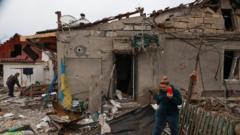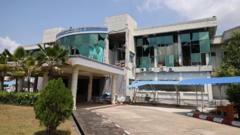In a significant diplomatic move, Russia seeks to maintain a presence in Syria while navigating new alliances in the changing political landscape.
**Russian Diplomats Arrive in Syria Amid Post-Assad Transition**

**Russian Diplomats Arrive in Syria Amid Post-Assad Transition**
A top Russian delegation visits Damascus to negotiate military agreements with Syria's new leadership following the fall of al-Assad.
On January 28, 2025, a high-ranking Russian delegation arrived in Damascus for the first time since the recent collapse of Bashar al-Assad’s regime. This visit marks a crucial opportunity for Russia to negotiate the future of its military bases in Syria with the newly established leadership. Senior officials in the delegation included Deputy Foreign Minister Mikhail Bogdanov and Special Presidential Envoy Aleksandr Lavrentiev, as reported by the Russian state news agency TASS.
The Syrian rebel coalition, which successfully ousted Mr. Assad, appears to be inclined toward preserving ties with Russia. Ahmed al-Shara, the group’s interim leader and head of Hayat Tahrir al-Sham, expressed the necessity of maintaining positive relations. In a recent interview with Al Arabiya, he emphasized that Russia is "an important country" for Syria, given its historical connections and shared geopolitical interests.
Despite the complicated past—marked by years of bloodshed and foreign intervention led by Russian military support for Assad—Mr. al-Shara indicated his desire to negotiate future interactions with Russia, stating, “We don’t want Russia to exit Syria in a way that undermines its relationship with our country.” He underscored Syria’s ongoing dependence on Russian provisions for military supplies and management of essential infrastructure.
The landscape in postwar Syria remains fraught with challenges, including the complex dynamics of former rivalries and shifting alliances. Additionally, while Hayat Tahrir al-Sham is designated a terrorist organization by both the U.S. and Russia, the move from Moscow to engage with al-Shara highlights a pragmatic approach in the scramble for geopolitical clout.
As the dust settles from the recent upheaval, the Russian delegation's dealings could play a pivotal role in shaping Syria's direction and its international alignments in the months to come.
The Syrian rebel coalition, which successfully ousted Mr. Assad, appears to be inclined toward preserving ties with Russia. Ahmed al-Shara, the group’s interim leader and head of Hayat Tahrir al-Sham, expressed the necessity of maintaining positive relations. In a recent interview with Al Arabiya, he emphasized that Russia is "an important country" for Syria, given its historical connections and shared geopolitical interests.
Despite the complicated past—marked by years of bloodshed and foreign intervention led by Russian military support for Assad—Mr. al-Shara indicated his desire to negotiate future interactions with Russia, stating, “We don’t want Russia to exit Syria in a way that undermines its relationship with our country.” He underscored Syria’s ongoing dependence on Russian provisions for military supplies and management of essential infrastructure.
The landscape in postwar Syria remains fraught with challenges, including the complex dynamics of former rivalries and shifting alliances. Additionally, while Hayat Tahrir al-Sham is designated a terrorist organization by both the U.S. and Russia, the move from Moscow to engage with al-Shara highlights a pragmatic approach in the scramble for geopolitical clout.
As the dust settles from the recent upheaval, the Russian delegation's dealings could play a pivotal role in shaping Syria's direction and its international alignments in the months to come.

















